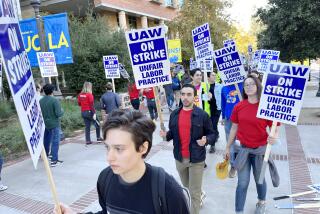Latinos Look for Political Beachhead on the Westside
Latino activists hope to establish a political beachhead on the Westside by forming a local chapter of the Mexican American Political Assn.
Organizers expect to launch the new chapter of the statewide organization this summer. It will cover Hollywood, West Hollywood, Beverly Hills, Bel-Air, Culver City, Santa Monica and Malibu.
“There is no real leadership here,” said Maria Leon, a backer of the new chapter. “And there are a lot of issues that need to be discussed.”
Leon and other organizers, including the heads of the Latino Resource Organization and the Westside Los Angeles Jaycees, will try to increase Latino participation in Westside politics through voter registration and education. They also will work on immigration reform and other issues. Their long-term goal is to elect Latino candidates to local and statewide offices.
The highest-ranking Latino politician on the Westside today is Fred Beteta of the Santa Monica Community College District Board of Trustees. Beteta, who was first elected in 1975, said Westside Latinos must develop some political muscle.
‘No Political Unity’
“There is a need for some sophisticated political development,” Beteta said. “There is no political unity among Hispanics on the Westside.”
The Mexican American Political Assn., popularly known as MAPA, has been active in California politics since the late 1950s and is deeply rooted in East Los Angeles. Some observers contend that its power has eroded in recent years, but Leon and others say the group still has high name recognition.
Virginia Reade, the regional director, said MAPA chapters are usually found in areas with large numbers of Latinos. The number of Latinos living on the Westside is unknown, but a report recently compiled by the Latino Resource Organization showed that they make up about 15% of Santa Monica’s population. Yolanda Becerra-Jones, head of the resource organization and a MAPA supporter, is preparing a similar study of the entire Westside.
Natividad Vazquez, coordinator of the Latino Supportive Services and Cultural Center at Santa Monica College, is another proponent of the Westside MAPA chapter. Vazquez said there has never been a serious effort to unify the diverse Latino population in Westside communities.
“All of the Latino organizations in the past have been single-issue groups,” Vazquez said. “This is an attempt to forge a coalition.”
Several of the people behind the Westside MAPA chapter are in their 30s and have been friends since college. They hope to rekindle among Latinos the activist spirit that existed in the late 1960s and early 1970s. Fred Escobar, whose family owns the Casa Escobar restaurant chain, said the idea of creating a Westside Latino power base is not so farfetched.
Patience Is Key
Escobar directs the Westside Los Angeles Jaycees, a predominantly Latino group with 72 members. He said most of them are young and just getting established in the business world, and would probably flock to an organization such as MAPA. The key to gaining power is patience, Escobar added.
“We might not get political clout immediately,” Escobar said. “But if the organization continued to grow, I think that people would pay attention. . . . Politicians say that they mostly associate Spanish-speaking people with the Eastside. So far, they haven’t heard anything from the west side of town.”
Indeed, Westside politics have been dominated by liberal, white Democrats, many of whom are Jewish. The most power political group is the Berman-Waxman organization, a group headed by U.S. Reps. Henry A. Waxman (D-Los Angeles) and Howard L. Berman (D-Panorama City). Its allies include Assemblymen Burt Margolin (D-Los Angeles) and Terry Friedman (D-Los Angeles), state Sen. Herschel Rosenthal (D-Los Angeles) and U.S. Rep. Mel Levine (D-Santa Monica).
Latinos on the Westside do not occupy a single seat on the Culver City, West Hollywood, Santa Monica or Beverly Hills city councils and they rarely are candidates.
Julie Lopez Dad ran for the Santa Monica City Council last year on the Santa Monicans for Renters’ Rights slate. In a hotly contested race in which six candidates ran for three at-large seats, Lopez Dad came in last. She said she could have benefited from the support of a Latino political organization.
‘Everyone Is Scattered’
“When I was a candidate it was difficult to make contacts,” Lopez Dad said. “Everyone is so scattered. . . . I think that an Hispanic can be elected. But there has to be a real push from the Hispanic community.”
Frank Casado, owner of the El Adobe Cafe in Hollywood, is one of the deans of Latino politics. Casado became active in MAPA during its early years and ran a Hollywood chapter during the mid-1970s. A huge picture of former Gov. Edmund G. Brown Jr. hangs in the window of his Melrose Avenue restaurant, and photos of politicians cover the walls inside.
Casado said there are two reasons why Latinos have never established a political presence on the Westside. The first, he said, is that the area is too affluent for low-income people to gain a foothold there. The second is the desire to assimilate. “Once you get out of the ghetto you don’t want to go back,” Casado said. “It’s like regressing.”
Leon and other backers of the new Westside chapter said success may depend on their ability to locate and recruit those Latinos who are not fully assimilated. Lopez Dad says the momentum is building, and that several Latino organizations are committed to the plan.
Beteta, a Republican, is reserving judgment. One problem, he said, is that MAPA traditionally has been a Democratic group. He said organizers should encourage participation by people from both political parties and understand that they are working in an extremely sophisticated political environment.
“There is a lack of political maturity,” Beteta said. “There are certainly a lot of capable people around. . . . But they haven’t developed the political awareness or sophistication to create their own agenda.”
More to Read
Start your day right
Sign up for Essential California for news, features and recommendations from the L.A. Times and beyond in your inbox six days a week.
You may occasionally receive promotional content from the Los Angeles Times.






